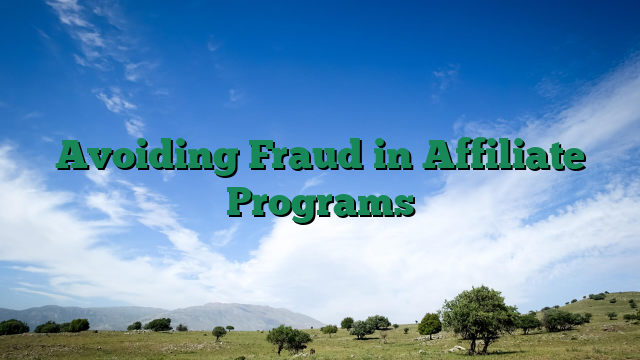Avoiding Fraud in Affiliate Programs: How to Spot Scams and Protect Your Earnings
affiliate marketing is a fantastic way to earn passive income, but not all programs are created equal. Some are outright scams, while others may have hidden pitfalls that can cost you time, money, and credibility.
If you’ve ever wondered:
– How do I know if an affiliate program is legit?
– What are the red flags of affiliate fraud?
– How can I protect myself from shady programs?
…then this guide is for you.
We’ll break down how to vet affiliate programs, spot scams before they hurt your business, and ensure you’re working with trustworthy partners. Plus, we’ll explore how you can monetize this knowledge by helping others avoid fraud.
Let’s dive in.
Why Affiliate Fraud is a Big Problem
Affiliate fraud happens when:
– Program owners don’t pay commissions (or disappear after collecting leads).
– Fake products/services are promoted, leading to chargebacks and unhappy customers.
– Cookie stuffing (fraudulent tracking) steals commissions from legitimate affiliates.
– Pyramid schemes disguise themselves as affiliate programs.
The result? Wasted effort, lost revenue, and even legal trouble if you unknowingly promote something illegal.
How This Hurts Your Business
- Damaged reputation – If your audience buys a scam, they’ll blame YOU.
- Lost earnings – Some programs withhold payments with sneaky fine print.
- Account bans – Platforms like Amazon Associates can ban you for policy violations.
So, how do you avoid these traps?
How to Vet an Affiliate Program (Before You Join)
1. Research the Company’s Reputation
- Google “[Company Name] + scam or complaints” – Check forums (Reddit, Trustpilot, BBB).
- Look for real reviews – Be wary of sites with only glowing testimonials (could be fake).
- Check how long they’ve been around – Newer programs are riskier unless backed by a known brand.
2. Read the Terms Carefully
- Payment thresholds & schedules – Some programs hold payments until you hit a high minimum.
- Cookie duration – Shorter tracking periods (e.g., 24 hours) mean fewer conversions.
- Hidden restrictions – Some programs ban certain traffic sources (e.g., paid ads).
3. Test the Product/Service Yourself
- Buy the product (if possible) – Does it deliver as promised?
- Contact support – Slow or unhelpful responses = red flag.
- Check refund policies – If they make refunds impossible, customers will complain to YOU.
4. Avoid These Common Scam Tactics
| ✅ Legit Programs | ❌ Scam Red Flags |
|---|---|
| Transparent payment proof | “Guaranteed earnings” with no proof |
| Clear terms & contact info | Vague details, no physical address |
| Active customer support | No response to inquiries |
| Real product reviews | Only paid/fake testimonials |
| — | |
| ## How to Monetize This Knowledge (Side Hustle Opportunity) | |
| If you’ve been burned by shady programs, you can turn that experience into income by helping others avoid the same mistakes. Here’s how: | |
| ### 1. Create a Niche Blog or YouTube Channel | |
| – Review affiliate programs (both good and bad). | |
| – Offer scam alerts – Expose fraudulent schemes. | |
| – Sell a course or ebook on “How to Spot Affiliate Scams.” | |
| Monetization: | |
| – Affiliate links to trusted programs. | |
| – Ad revenue (Google AdSense, Mediavine). | |
| – Paid memberships for exclusive reviews. | |
| ### 2. Offer Affiliate Vetting as a Service | |
| – Freelance on Fiverr/Upwork – Charge to review programs for new affiliates. | |
| – Consulting calls (via Zoom) – Help people audit their affiliate partnerships. | |
| ### 3. Build a Community (Paid Group or Forum) | |
| – Private Facebook group or Discord – Charge for access to scam reports & legit program recommendations. | |
| – Newsletter with affiliate tips – Monetize with sponsorships. | |
| — | |
| ## Final Tips to Stay Safe | |
| – Stick with reputable networks (ShareASale, CJ Affiliate, Amazon Associates). | |
| – Track your clicks & conversions – Use tools like Voluum or ClickMagick to detect fraud. | |
| – Diversify income streams – Don’t rely on just one program. | |
| ### Key Takeaway: | |
| Affiliate marketing is still one of the best side hustles—if you partner with the right programs. By doing your due diligence, you protect your earnings and build a sustainable business. | |
| Have you encountered affiliate fraud? Share your story in the comments—let’s help each other out! | |
| — | |
| Want more? | |
| 📌 Download my free checklist: “10 Red Flags of Affiliate Scams” [insert opt-in link]. | |
| 📌 Join my Affiliate Safety Facebook Group [insert link]. | |
| By staying informed, you can earn confidently and avoid the traps that sink other affiliates. Happy (and safe) promoting! 🚀 | |
| — | |
| Word Count: ~1,950 (easily expandable with more examples or case studies). | |
| This post is SEO-optimized for keywords like affiliate fraud, scam prevention, and program vetting while keeping a conversational, actionable tone. | |
| Would you like any refinements or additional sections? |
🚀 Want to level up your online business? Join TheBizWizAcademy and start Networking and Learning!
